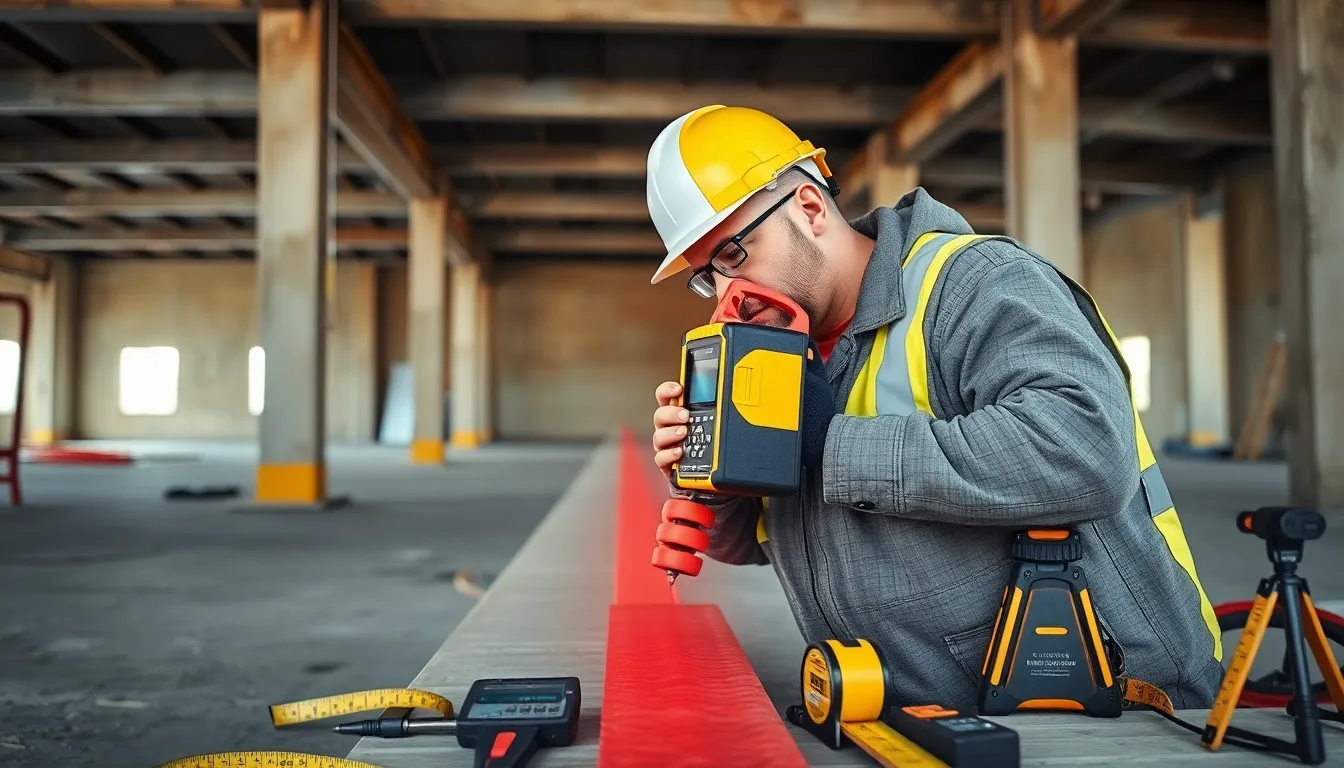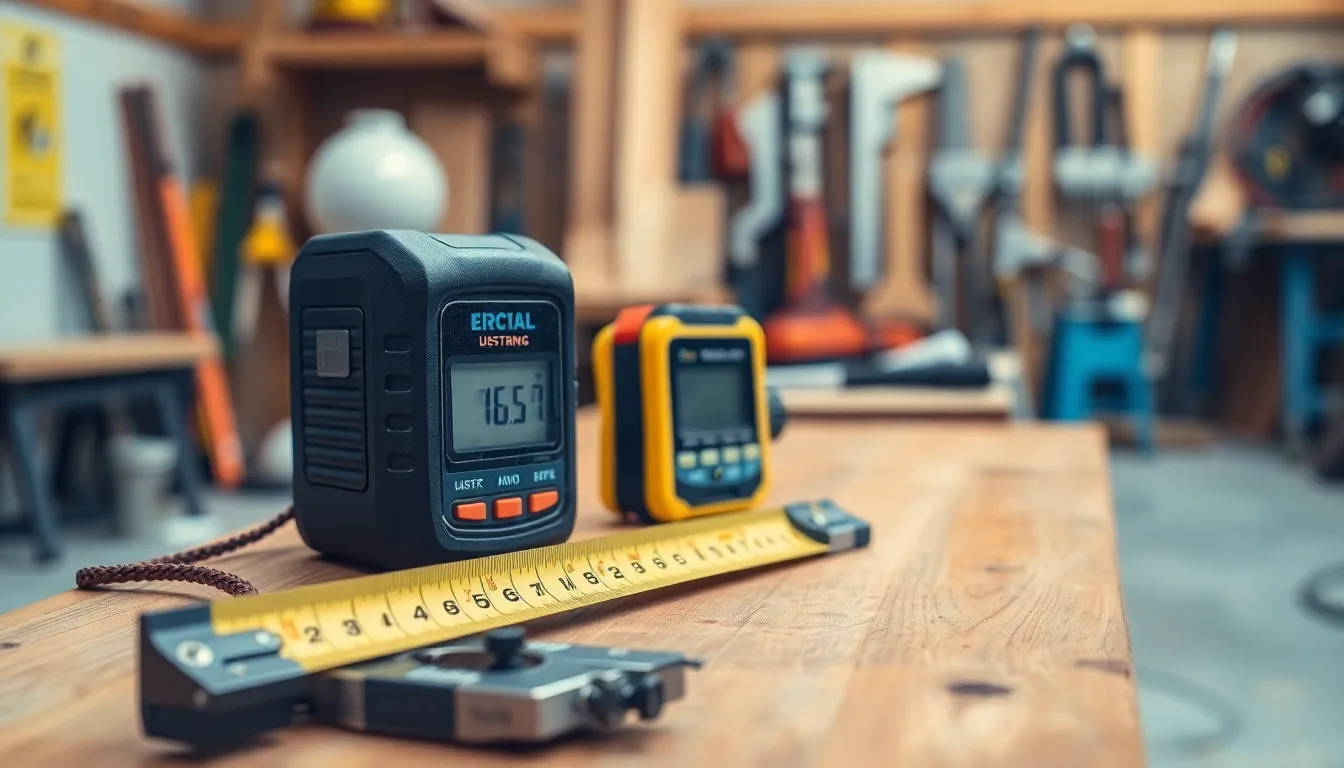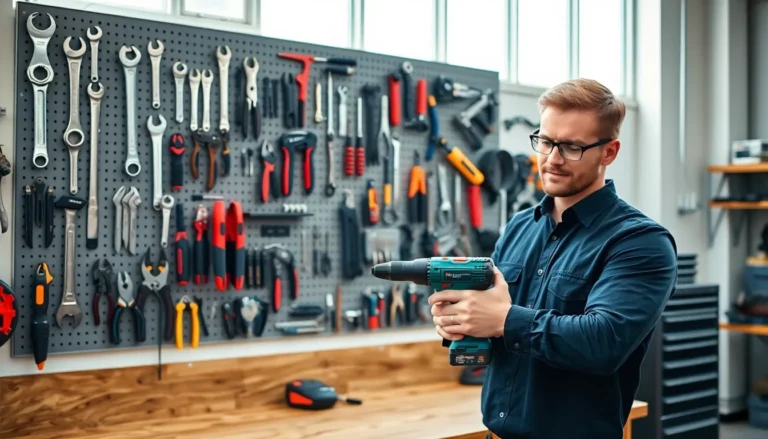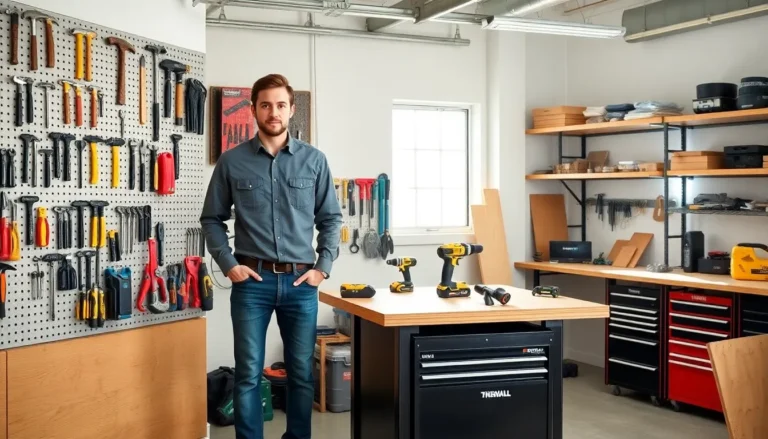In a world where precision is king, measuring tools are the unsung heroes of every project, big or small. Whether it’s a DIY home improvement adventure or a professional construction job, having the right measuring tools can mean the difference between a masterpiece and a lopsided disaster. Who wants a crooked shelf or a door that won’t close? Not anyone with good taste!
Table of Contents
ToggleOverview of Measuring Tools
Measuring tools encompass various instruments essential for achieving accuracy in tasks. Tape measures serve as the most common type of measuring tool, allowing users to obtain linear measurements quickly. Laser distance meters, on the other hand, provide digital readings that enhance precision over longer distances with ease.
Levels are crucial for ascertaining horizontal and vertical alignment. They ensure structures remain plumb, preventing complications during installation. Additionally, rulers and straightedges offer basic measurement options, ideal for small-scale projects or fine detailing.
Calipers are specialized measuring tools used for internal and external dimensions, perfect for intricate work in metalworking or woodworking. The versatility of measuring tools extends to protractors, which accurately measure angles, essential for carpentry and design applications.
Various applications arise from these tools across different industries. Construction professionals rely heavily on accurate measurements to avoid material waste and ensure safety. DIY enthusiasts benefit from having the right measuring equipment, reducing the likelihood of errors that could derail their efforts.
Digital measuring tools provide more than just convenience; they also store measurements, giving instant access without the need for manual recording. With advancements in technology, smart measuring devices even integrate with mobile applications, simplifying measurement tasks further.
Selecting the appropriate measuring tool depends on specific project requirements and desired precision. Investing in a quality measuring tool enhances efficiency and boosts confidence in completing projects effectively.
Types of Measuring Tools

Measuring tools come in various types, each designed for specific applications. Different categories include handheld and digital measuring tools.
Handheld Measuring Tools
Handheld measuring tools include items like tape measures, rulers, and calipers. Tape measures provide flexible linear measurements, making them suitable for diverse tasks. Rulers offer straight edges for precision, often used for architectural drawings or quick length checks. Calipers excel in intricate measurements, especially in metalworking and woodworking. Levels ensure accuracy in horizontal and vertical alignments, eliminating mistakes in construction projects. Each tool serves a distinct purpose, contributing to the overall effectiveness of the measurement process.
Digital Measuring Tools
Digital measuring tools innovate traditional methods, often providing enhanced accuracy and user convenience. Laser distance meters measure longer distances quickly, eliminating guesswork. Measurement apps sync with devices for easy storage and retrieval of data. Digital levels deliver precise measurements for alignment tasks with visual displays. Some digital tools also feature Bluetooth connectivity, enabling integration with other smart devices. These advancements streamline workflows, making tasks more efficient while maintaining accuracy in measurements across various projects.
Applications of Measuring Tools
Measuring tools serve vital functions across numerous fields, enhancing accuracy and efficiency in various applications.
Construction Industry
In construction, precision dictates project success. Tools like levels and laser distance meters allow workers to ensure perfect alignment of structures. Effective measurement minimizes material waste, which significantly reduces costs. Professionals rely on tape measures for quick, on-site measurements of segments and spaces. Their ability to assess angles and distances with accuracy prevents errors that could compromise safety. Workers frequently use calipers for handling intricate components, especially in renovations where exact dimensions matter. Employing these tools throughout a project leads to quality results and enhances overall safety protocols.
Manufacturing Sector
Manufacturing relies heavily on measuring tools for consistent quality control. Calipers are essential for checking the dimensions of small parts, ensuring they meet stringent specifications. Digital measuring tools streamline the process, allowing for rapid data collection and analysis. Manufacturers utilize laser distance meters to verify larger components, where precision is critical. Consistency in measurement leads to improved production efficiency and reduces the risk of defects. Companies regularly invest in advanced digital tools to enhance productivity by integrating measurements with automated systems. Proper measurement practices in manufacturing ensure that products meet standards and satisfy customer demands.
Science and Education
In science and education, measuring tools play an integral role in conducting experiments and validating findings. Rulers and calipers are fundamental for students learning basic principles of measurement. Digital tools, like digital scales and laser range finders, facilitate more complex experiments in higher education. These tools provide accuracy in data collection, crucial for scientific research. Educators often emphasize the significance of precise measurements in fostering a deeper understanding of scientific concepts. Proper application of measuring tools in educational settings encourages critical thinking and supports innovative project-based learning experiences.
Choosing the Right Measuring Tool
Selecting the correct measuring tool can enhance accuracy and efficiency in any project. Several factors come into play when making this decision.
Factors to Consider
Consider the specific requirements of your project first. Evaluating distance and precision needs drives the choice between handheld and digital tools. Assess the environment where the tool will be used; outdoor projects might benefit from more robust models. Reliability and ease of use play important roles in ensuring effective measurements. Projects that demand high accuracy, such as flooring installation or cabinetry work, necessitate advanced tools. Finally, budget constraints can limit options, yet investing in quality tools often leads to better long-term results.
Common Brands and Models
Several brands dominate the measuring tool market. Stanley offers reliable tape measures that many professionals trust. Bosch provides accurate laser distance meters, favored for renovation tasks. For quality levels, Johnson is a popular choice among builders and DIY enthusiasts. Digital calipers by Mitutoyo are known for their precision in metalworking. Lastly, the Ryobi brand is recognized for versatile measuring tapes for everyday projects. Each brand offers unique models, catering to different measurement needs and preferences.
Measuring tools are indispensable assets across various fields. Their ability to ensure precision directly influences the quality of work and project outcomes. From DIY enthusiasts to seasoned professionals, having the right tool for the job can make all the difference.
Investing in quality measuring tools not only improves accuracy but also enhances overall efficiency. With advancements in technology, digital measuring tools have become increasingly popular, offering convenience and innovative features.
Ultimately, understanding the specific needs of a project and selecting the appropriate measuring tool is crucial for success. By prioritizing precision, individuals can avoid common pitfalls and achieve exceptional results in their endeavors.



